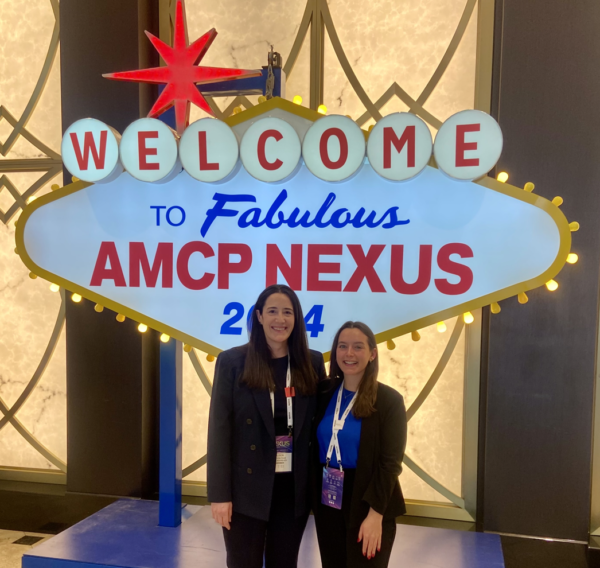
Applied Policy Health Policy Vice President Alison Falb and Senior Health Policy Associate Emma Hammer joined nearly 3,000 attendees at the Academy of Managed Care Pharmacy (AMCP) Nexus conference October 14-17 in Las Vegas, Nevada, to connect with fellow stakeholders at the forefront of managed care pharmacy innovation. A key industry event, AMCP Nexus brings together pharmacists, payers, manufacturers, providers, and industry partners. Attendees could choose from a number of educational tracks, including Drugs, Diseases, and Managed Care Impact; Legislative and Regulatory Trends; and Making the Way for Innovation. With education sessions, networking events, and keynote presentations, the conference offered multiple opportunities for those in the managed care space to share ideas and learn about the latest issues in healthcare.
2025 is poised to be a year of change in the health policy space. Beginning January 1, 2025, significant changes under the Inflation Reduction Act (IRA) Part D benefit redesign will go into effect, adding another layer of complexity to the interplay between patient access, formularies, and manufacturer considerations. Stakeholders are also watching for a proposed rule from the Department of Health and Human Services and the Departments of Labor and Treasury on the use of copay accumulators and maximizers, which is expected to have a significant impact on Exchange plans.
This week’s election results have added a new layer of complexity to assessing the managed care landscape. In the coming weeks, stakeholders will be watching closely to better understand the implications of the incoming administration’s policy priorities.
Despite the number of changes expected in the new year, AMCP Nexus highlighted ongoing areas of interest that are likely to remain top priorities moving forward. Biosimilar adoption and uptake, cell and gene therapies, and GLP-1s and anti-obesity medications continue to spark interest and discussion for managed care professionals, as Food and Drug Administration (FDA) approvals of these therapies are expected to grow. What remains clear is that questions about coverage, cost, and patient outcomes, cannot be answered through a one-size-fits-all approach.
Sixteen biosimilars were approved in 2024, and an additional 43 are expected in the next three years, indicating continued growth in this area. For cell and gene therapies, stakeholders are considering how to best facilitate patient access to these medicines, as they have unique patient-centric, logistical and operational, and financial challenges.[2] The Centers for Medicare & Medicaid Services (CMS) is aiming to address some of these challenges through the Cell and Gene Therapy (CGT) Access Model, which is set to begin on January 1, 2025, with an initial focus on sickle cell disease, but questions remain about what pathways to coverage will be the most successful in reaching patients.[3] On GLP-1s, payers are considering how to cover these newer, higher-cost therapies, particularly as additional indications impacting expanded populations are likely forthcoming.[4] Stakeholders are also continuing to consider the role of real-world evidence in interactions between plans and manufacturers, including its use in benefit design and pre-approval communications.
Applied Policy appreciated the opportunity to connect with colleagues on emerging industry trends. Keeping abreast of the latest developments in the complex landscape of managed care strengthens our expertise and positions us to best represent our clients’ interests. We look forward to connecting with colleagues at future AMCP events, including the 2025 AMCP Annual meeting in Houston, Texas, March 31- April 3, the 2025 AMCP Nexus conference in National Harbor, Maryland, October 27-30, 2025, and events with the Mid-Atlantic AMCP Affiliate group.

Alison Falb (left) and Emma Hammer
[1] Liu, Y; Vishwanath, S. “Specialty Pharmaceuticals in Development.” Presented at AMCP Nexus. October 14-17, 2024. Las Vegas, NV.
[2] Niehoff, K; Statt, J. “Gene Therapy in Sickle Cell Disease – Breakthroughs in Treatment and Coverage.” Presented at AMCP Nexus. October 14-17, 2024. Las Vegas, NV.
[3] Centers for Medicare & Medicaid Services. Cell and Gene Therapy (CGT) Access Model. Available at https://www.cms.gov/priorities/innovation/innovation-models/cgt
[4] Anderson, E; Fitch, A; McVeigh, M. “’Pound for Pound’ Assessment of Anti-Obesity Medications, Coverage Policies, and Financial Considerations.” Presented at AMCP Nexus. October 14-17, 2024. Las Vegas, NV.
